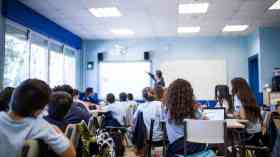Celebrating technology enhanced learning
 Technology makes a real difference to a learner’s achievement and engagement – it offers access to resources that would otherwise be beyond the reach of any school or college, it allows communication and collaboration beyond the physical and temporal limits of the classroom; and it allows learners to think more clearly and see the world from another perspective.
Technology makes a real difference to a learner’s achievement and engagement – it offers access to resources that would otherwise be beyond the reach of any school or college, it allows communication and collaboration beyond the physical and temporal limits of the classroom; and it allows learners to think more clearly and see the world from another perspective.
Naace has a long standing history of supporting those working in education to use technology to achieve the greatest possible impact, and through its Impact Awards, seeks to provide some formal recognition of outstanding work in this area.
On 26 March during the Naace Strategic Conference, the winners of the Impact Awards were announced.
Community Impact Award
The winner of the Community Impact Award – which recognises a project that has had a significant impact on the school and its wider community – went to Eastlands Primary School in Warwickshire for its innovative approach to promoting e-safety.
The school recognised the need for appropriate teaching resources to educate primary aged children about the positive and potentially negative aspects of the internet and other online technologies.
A class of children took on the role of Esafety ambassadors for the school and over a two year period created ‘The Anti Social Network’, a film to raise awareness of cyberbullying, and ‘Not Such a Sweet Tweet!’, an esafety theatre production that identifies positive and negative aspects of the internet.
The school has received an overwhelming amount of positive feedback from other schools, professionals, police forces, e-safety experts. What’s more, the headteacher has spoken at a number of high profile events to share her knowledge and understanding of safety related issues, including a high profile event at the European Commission.
Leadership
The Leadership Impact Award, which recognises an individual or team who demonstrate initiative-driven leadership, went to Nathan Williams of Herringthorpe Junior School.
Nathan has demonstrated outstanding leadership of ICT in the school over the last eight years. The school’s leadership was evaluated as ‘Outstanding’ by Ofsted at its inspection in July 2014 and this strength of leadership equally applies to the school’s computing strategy. The standards of pupils attained in ICT are well above those expected at key stage 2, they are exceptional. (ICT Mark assessment Dec 16 2014).
There has been a strategic and systematically implemented plan for school improvement in which ICT has been integral. From this structured implementation the school has extended its provision of iPads, and interactive TVs in each classroom are linked to devices through Apple TV. This is now an embedded technology, used routinely. Staff CPD has been delivered alongside these development so that staff are empowered and confident.
Technical Support
The Technical Support In Schools Service Impact Award goes to the school whose technical support has made a difference to the learning opportunities and outcomes of young people. London Connected Learning Centre won the award.
The three members of the team work closely with school senior leaders helping them to articulate their vision for learning, designing them an effective, agile infrastructure that responds to the needs of the curriculum.
Early Years
The Early Years & Primary Impact Award, sponsored by Rising Stars, recognises a project that demonstrates the impact technology can have in an early years or primary setting. Claire Lotriet from Henwick Primary School in South London won the award. Claire wrote Switched On Computing: Take your first easy steps with Microsoft, a free resource pack sent to every infant, junior and primary school in the country. The projects teach computing skills in context, giving schools opportunities to develop enterprise skills with computing skills in tandem. What’s more the materials give teachers confidence when teaching the new curriculum.
Secondary Impact Award
Hannah Draper from Herts & Essex school scooped the Secondary Impact Award, sponsored by Asus. The development and introduction of new technologies into the Design and Technology faculty has enhanced the learning of students dramatically. Hannah has brought new ideas and skills into the department which have allowed students across the Key Stages to understand the developments of technology within industry and has also allowed the students to create products of a much higher standard. This development has included the use of the laser cutter, sublimation printing on a variety of materials and the introduction of the 3D printer to students and staff alike.
Inclusion Award
The Inclusion Impact Award, sponsored by Show My Homework, went to Innovation School. Through a computer aided approach to learning, a group of special school students and a group of students from a PRU that demonstrated challenging behaviours, significantly improved the way they engaged and made progress in their learning. From this Innovation School, Stoke was developed with the aim of providing a holistic learning opportunity for any student regardless of ability or barriers to learning. This provision has engaged learners that have traditionally refused or been unable to learn, with some of the students out of education for over three years.
SEN Impact Award
The SEN Impact Award recognises a project which supports, motivates and enables young people with learning needs and/or disabilities to develop skills and knowledge through the use of innovative technology. This year’s winner was Gesture Based Technology Professional Learning. Pupils who were previously only able to achieve a very limited amount themselves due to physical and sensory disabilities have improved at learning and expressing themselves greatly through the use of gesture-based technologies, alongside the existing use of teaching and learning methodologies. This systematic and pioneering work has now spread to partner schools and the wider SEN community worldwide.
Curriculum Support
The Curriculum Support Service Impact Award recognises a service which has helped to create an environment and curriculum that stimulates better learning, making full use of technology. Apps for Good won the award as it demonstrates how computing is creative, can be applied to what they care about, and can help solve problems.
Apps for Good is a registered charity which uses open-source technology to build a new global generation of problem solvers and makers: students who can create, launch and market new products that change the world.
Apps for Good partners with educators in schools and learning centres to deliver their app development course to young people 10-18 years of age. Apps for Good provides the course content, training and connections to Expert volunteers, and then lets teachers do what they are best at – inspiring and guiding young people.
Further information
www.naace.co.uk
Latest News
13/11/2025 - 12:14
Event for school leaders, governors and education professionals relocates to the historic Old Billingsgate venue in London.
13/11/2025 - 09:49
The regulations have been set following a second consultation and detailed collaborative working with organisations and people across deaf and hearing communities.
13/11/2025 - 09:39
The Education Committee has published a letter to the Secretary of State for Education asking for more detail about the Department for Education’s work on developing its SEND reforms.
13/11/2025 - 09:26
New analysis by NFER has highlighted the uneven distribution of pupils with special educational needs and disabilities (SEND) across mainstream schools in England.
12/11/2025 - 09:27
Schools will be issued with AI-powered minimum attendance improvement targets from this month, the Department for Education has announced.







